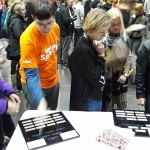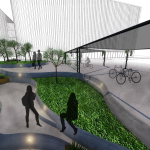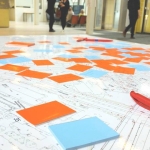The new Campus Albano is the newest addition to Stockholm University, and will spatially connect the existing campus with the Royal School of Technology (KTH), and the city centre. The design work of the campus was developed as an alternative vision for the site, and came about in collaboration between researchers at the Stockholm Resilience Centre, the Beijer Institute of Ecological economics, and the Royal School of Architecture in Stockholm as well as with practising architects. In 2010, this group called the PatchWork Group presented the alternative vision to the city planning office, to local politicians, and to the university leadership, and won their support. The vision was developed into a detailed plan, co-designed with the city architect in Stockholm and approved by the City of Stockholm in 2012. The construction work of Campus Albano started in November of 2015.
Insights from the working process include the importance of:
1) Interdisciplinary working collaborations between different disciplines as well as employees centrally at SU, allowing for productive exchange of knowledge and terminology.
2) Transdisciplinary translation of scientific knowledge into physical, institutional and discursive artefacts that both ‘protect’ and communicate the vision.
3) Respect for and knowledge about how to navigate within the power landscape in which urban planning and design is embedded.
The participatory design process and the resulting campus plan, where institutional designs, ecosystems and the provisioning of ecosystem services are central, initiated the beginning of a new research paradigm within urban sustainability science: Social-Ecological Urbanism. The concept of Social-Ecological Urbanism is a novelty since it deals not only with designs for mitigation of CO2 emissions, but also with measures to enhance the adaptive capacities of a city or a particular area by integrating ecosystems and their services in planning and urban design. The wider perspective is important for finding design solutions that can meet Stockholm city’s aim of ecosystem-based urban transformation, as it opens up for novel design ideas and increased exchange of knowledge. It can also influence the international debate on sustainable urban development.
Stockholm Resilience Centre (SRC) is an international research centre placed under the Faculty of Science at Stockholm University, functioning as an international, innovative science-to-policy institution at the frontier of sustainability science. The Centre is a creative hub for generating new scientific understanding, to draw on multiple perspectives and to build new scientific methods and languages on the international arena. One of SRC’s aims in the Live Baltic Campus project is to engage in international exchanges of knowledge, both within the Baltic region and beyond, to spread information about the co-creation process that lead to the Campus Albano, and to gain insights that may be used for participatory design processes in other areas.









